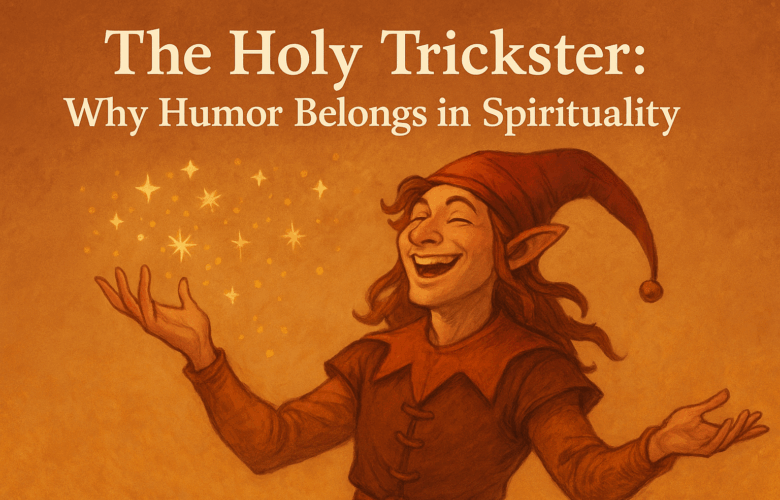There is a kind of holiness in laughter that cannot be faked. It bubbles up from the belly, erupts through the chest, and shakes the body in a way that dissolves all pretension. Laughter is a great leveler. It topples pedestals, punctures pomposity, and reminds us—gently or not so gently—that none of us are gods, and none of us should act as though we are.
Throughout human history, the sacred and the comic have always been closer than polite religion likes to admit. Mythologies around the world make room for the trickster: the coyote who fools the stronger animals, the monkey who mocks the heavens, the clown who stumbles but secretly guides the people. These figures exist not in spite of spirituality, but because of it. They keep us humble. They keep us real. They keep us laughing when the alternative would be despair.
Laughter as a Sacred Act
To laugh is to release control. It is a surrender of seriousness, a letting-go of the tight grip we often keep on our stories about ourselves and the world. In that release, something holy happens: we remember that we are small, that we are temporary, and that we are beautiful in our smallness.
A shared laugh with others can feel like prayer. The air between us changes. Our breathing syncs. The edges soften. For a moment, we are knit together by joy, by absurdity, by delight. In those moments, the sacred is not in solemnity but in silliness.
The Trickster’s Role
Sacred stories often feature the trickster as both disruptor and teacher. Tricksters lie, cheat, and play pranks—but their mischief has purpose. They reveal hypocrisy. They show us where our systems are brittle. They expose the foolishness of pride.
When faith or philosophy grows too rigid, the trickster arrives to shake the tower and remind us that no tower stands forever. When leaders exalt themselves as untouchable, the trickster laughs, and the mighty are unmasked. Humor clears the cobwebs of certainty, making space for new wisdom to blow in.
Satire and Parody as Spiritual Tools
Satire is a holy art when wielded with compassion. It mocks cruelty and hypocrisy, not to destroy but to awaken. Parody takes the seriousness of our rituals and bends them toward laughter, reminding us that ritual is not about power but about play.
To parody what is sacred is not necessarily to desecrate it. Sometimes parody reveals the deeper truth—that holiness cannot be confined to solemn words and stone temples. A parody hymn sung with love may open more hearts than a thousand straight-faced sermons.
Why We Resist Holy Humor
Many traditions treat humor as dangerous, even profane. Leaders fear being laughed at, because laughter is power. A joke can do what a hundred arguments cannot—it can free people from fear. To laugh at the supposedly untouchable is to reclaim your own dignity.
But if a faith cannot endure laughter, perhaps it was never that strong to begin with. If our gods cannot survive parody, perhaps we have mistaken our own fragile egos for the divine.
Joy as Resistance
Laughter is not only humility; it is resistance. In times of oppression, humor has always been a secret weapon. Jesters mocked kings. Comedians mocked dictators. The powerless laughed behind closed doors, and that laughter became a rehearsal for freedom.
Joy itself is radical in a world that profits from despair. To keep laughing, to keep playing, to keep singing parody songs when the world insists on silence—that is a sacred act of defiance.
The Invitation
So let us welcome the Holy Trickster into our spiritual lives. Let us laugh at ourselves, laugh at our rituals, laugh at the absurdity of existence itself. Not with cruelty, but with reverence. With the reverence that understands that love without laughter becomes brittle, and truth without parody becomes dangerous.
The divine does not need defending from our jokes. If anything, the divine is laughing with us, delighted at the sight of humans stumbling through mystery with joy on their lips.
Because in the end, holiness is not only in the silence of the temple or the thunder of the sermon. Holiness is in the giggle, the snort, the belly laugh, the eye-roll, and the parody hymn sung off-key but full-hearted.
Holiness is not afraid of laughter. Holiness is laughter.


